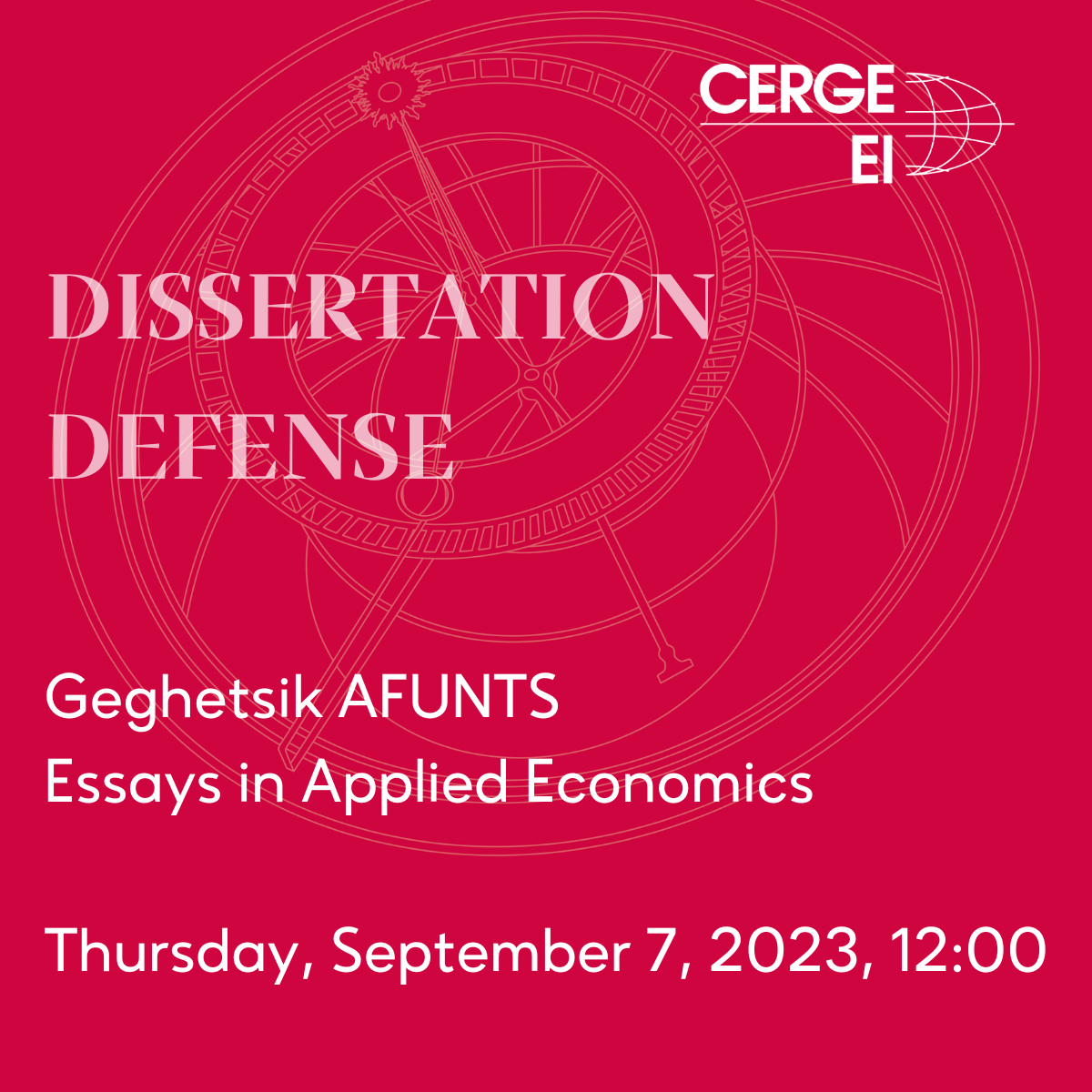Dissertations
Thursday, 7 September, 2023
Geghetsik Afunts: Essays in Applied Economics

Dissertation Committee:
Štěpán Jurajda (CERGE-EI, chair)
Randall K. Filer (The City University of New York)
Alena Bičáková (CERGE-EI)
Mariola Pytliková (CERGE-EI)
Nikolas Mittag (CERGE-EI)
Defense Committee:
Andreas Menzel (CERGE-EI)
Sebastian Ottinger (CERGE-EI)
Josef Montag (Faculty of Law, Charles University)
Referees:
Selma Walther (University of Sussex)
Georgi Kocharkov (Research Center, Deutsche Bundesbank)
Online connection: https://call.lifesizecloud.com/19007630, Passcode: 9279
Abstract:
The first chapter of this dissertation investigates whether the introduction of unilateral divorce legislation (UDL), which started in the late 1960s affected the educational structure of marriage. Based on marriage and divorce certificate data covering 1970-1988, we (Štěpán Jurajda and I) provide new evidence on the evolution of the educational structure of marriage inflows (newlyweds) and outflows (divorces). We estimate a difference-in-differences model to gauge the impact of UDL on both of these flows. While UDL did not contribute to rising homogamy (the tendency towards married partners having the same level of education), it did affect the educational structure of marriage: it made generally unstable hypogamous couples (women marrying less educated partners) less likely to divorce, and it made homogamous couples more stable than hypergamous ones (women marrying more educated partners).
The second chapter argues that the changes in family regulations that affect marriage stability could also affect fertility decisions and thereby the fertility differentials of homogamous couples (with the same education level) versus non-homogamous couples. It has been shown that the introduction of joint custody laws (JCLs) in the US affected family decisions, including overall fertility, but there is little research on whether these reforms' effects differ between homogamous and non-homogamous couples. I leverage the staggered introduction of JCLs across US states and employ large administrative data from birth certificates to investigate the reforms' effects on family structure at birth. I find that marginal-free measures of educational assortative matching of parents - the odds of homogamy - increase in states adopting JCLs. The channel that increases the odds of homogamy of parents is a relative increase in births for married homogamous couples rather than a change in the incentive to marry for pregnant couples.
In the third chapter (authored jointly with Misina Cato and Tobias Schmidt) we study the new challenges that Russia's invasion of Ukraine is posing to the global economy, namely the impact on the inflation expectations of individuals, which in turn impacts the inflation rate. We aim to quantify the effect of the invasion on short- and long-term inflation expectations of individuals in Germany. We use microdata from the Bundesbank Online Panel - Households (BOP-HH), for the period from February 15th to March 29th, 2022. Treating the unanticipated start of the war in Ukraine on the 24th of February 2022 as a natural experiment, we find that both short- and long-term inflation expectations increased as an immediate result of the invasion. Long-term inflation expectations increased by around 0.4 percentage points, while the impact on short-term inflation expectations was more than twice as large - around one percentage point. Looking into the possible mechanisms of this increase, we suggest that it can be partially attributed to individuals' fears of soaring energy prices and increasing pessimism about economic trends in general. Our results indicate that large economic shocks can have a substantial impact on both short and long-term inflation expectations.
Full Text: "Essays in Applied Economics"








